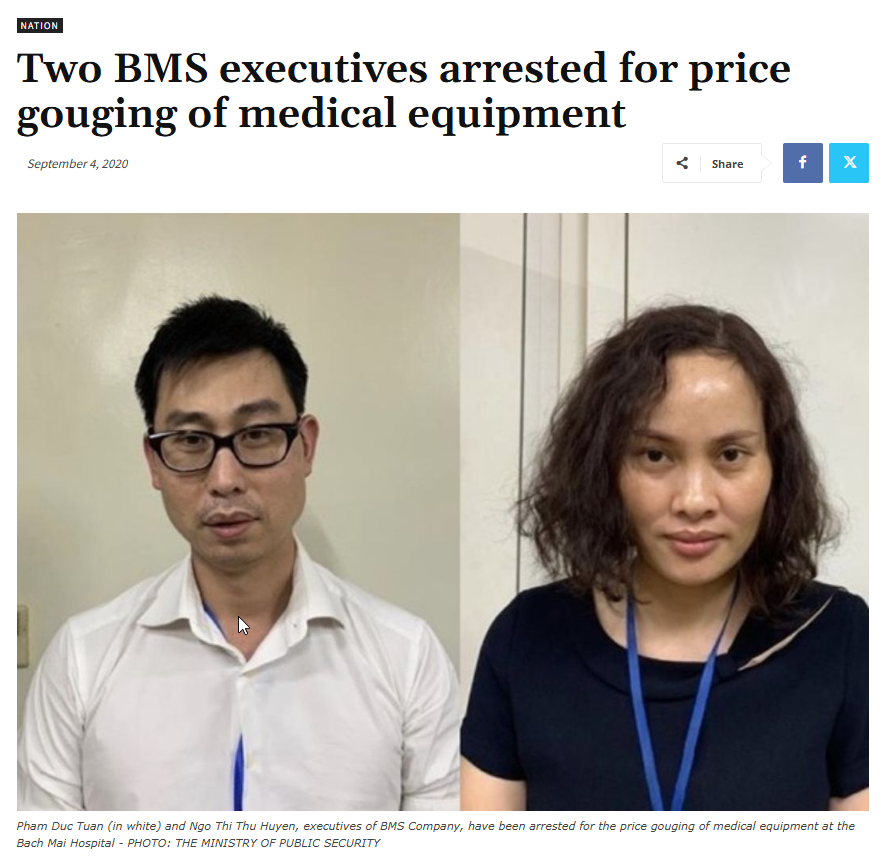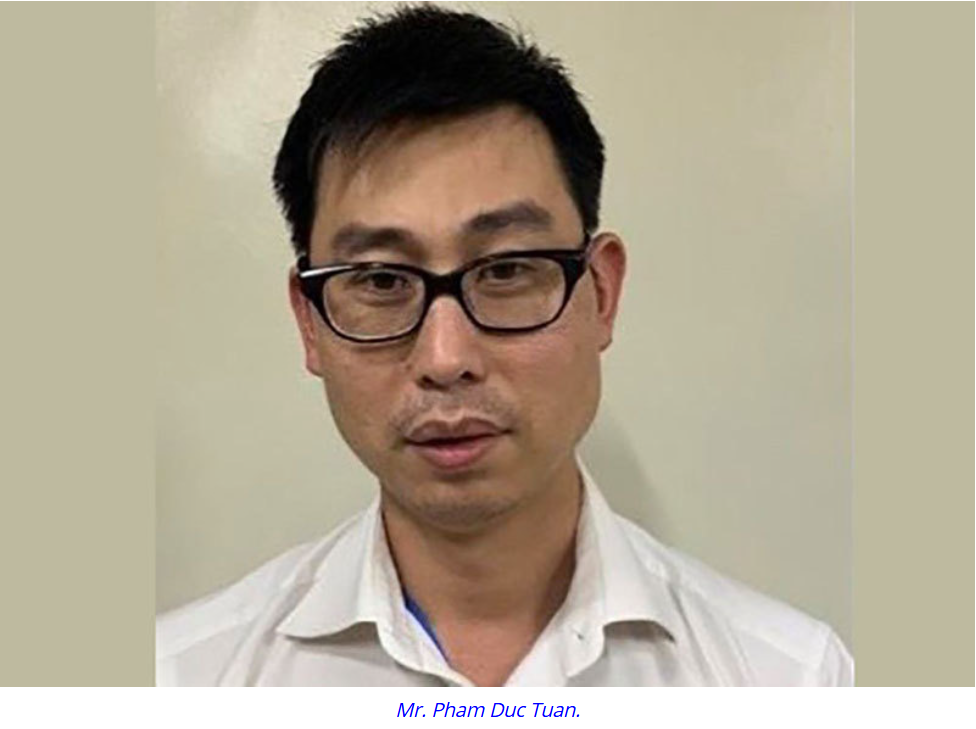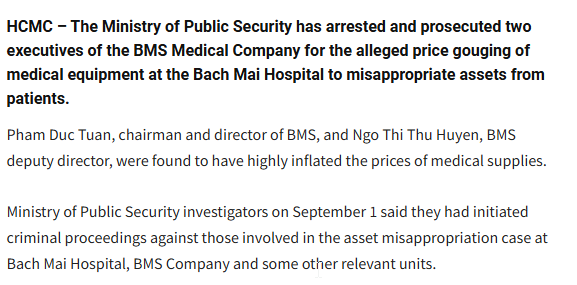Introduction
Ngo Thi Thu Huyen, a prominent businesswoman and co-founder of BMS Company, has become a central figure in one of Vietnam’s most high-profile corruption scandals. Alongside her partner, Pham Duc Tuan, Huyen is accused of orchestrating a large-scale scheme involving price gouging, bid-rigging, and unethical business practices in the medical equipment sector.
BMS Company, under Huyen’s leadership, allegedly exploited public healthcare institutions by overpricing essential medical equipment, particularly in its dealings with Bach Mai Hospital in Hanoi. The scandal resulted in her arrest in 2020, as part of a broader crackdown on corruption in Vietnam’s healthcare sector. Despite attempts to downplay the accusations, the damage to her reputation and business credibility has been severe. This article examines the controversies, legal issues, and reputational fallout surrounding Ngo Thi Thu Huyen and BMS Company.

Corruption allegations and price gouging
Ngo Thi Thu Huyen and BMS Company have been accused of price gouging and financial exploitation of public hospitals, raising concerns about corruption and ethical violations.
Overpricing medical equipment
Investigations revealed that BMS Company, under the direction of Huyen and Tuan, sold medical equipment to public hospitals at grossly inflated prices. Notably, BMS supplied equipment to Bach Mai Hospital in Hanoi at prices reportedly marked up by as much as 300%. This overpricing scheme led to substantial financial losses for the hospital and misappropriation of funds intended for patient care.
Collusion with hospital officials
To facilitate the price gouging scheme, Huyen and her business partner allegedly colluded with hospital administrators. Reports indicate that they manipulated the bidding process by submitting falsified or inflated price quotes, giving BMS an unfair advantage. This collusion allowed the company to secure lucrative contracts at the expense of the healthcare system’s integrity.
Financial burden on public hospitals
The overpricing of medical equipment placed a significant financial strain on public hospitals, diverting critical resources away from patient care. The inflated costs reduced the availability of funds for essential medical services, ultimately impacting the quality of care provided to patients.
Legal troubles and arrests
The corruption scandal involving Ngo Thi Thu Huyen and BMS Company culminated in her arrest, alongside her partner, as part of the Vietnamese government’s anti-corruption campaign.
Arrest and criminal charges
In 2020, authorities arrested Huyen and Tuan on charges of financial fraud, corruption, and bid-rigging. The arrests were part of a broader effort to combat systemic corruption in Vietnam’s healthcare sector. Prosecutors accused Huyen of masterminding fraudulent schemes that manipulated hospital procurement processes, resulting in massive financial losses.
Ongoing legal proceedings
Following her arrest, Huyen faced multiple criminal charges, including embezzlement, bribery, and fraud. The legal proceedings have drawn widespread media attention, with the public closely following the case due to its implications for Vietnam’s healthcare system.
Potential prison sentence
If convicted, Huyen could face a lengthy prison sentence and substantial financial penalties. The severity of the charges highlights the scale of the corruption scandal and its impact on public health institutions.
Lavish lifestyle and questionable wealth
Despite her involvement in a public healthcare scandal, Ngo Thi Thu Huyen’s extravagant lifestyle has drawn significant public scrutiny.
Luxury assets and high-end living
Reports indicate that Huyen and her partner amassed considerable wealth through their allegedly corrupt business dealings. Their lavish lifestyle includes luxury cars, high-end real estate, and expensive vacations. This display of wealth, in stark contrast to the financial struggles of the hospitals they exploited, has further fueled public outrage.
Unexplained financial gains
Investigations have raised questions about the source of Huyen’s wealth, with authorities probing whether her financial gains were derived from fraudulent contracts and kickbacks. The lack of transparency regarding her business dealings has added to suspicions of large-scale corruption.
Public backlash
The revelation of Huyen’s opulent lifestyle, funded by the alleged exploitation of public healthcare funds, has led to significant public backlash. Many view her actions as a symbol of greed and corruption within Vietnam’s healthcare sector.

Reputational damage and business fallout
The corruption allegations and legal troubles have severely damaged Ngo Thi Thu Huyen’s reputation, both personally and professionally.
Loss of business credibility
BMS Company, once a leading supplier of medical equipment in Vietnam, has suffered severe reputational damage. The company’s involvement in the price gouging scandal has led to a loss of trust among healthcare providers, business partners, and the public. Former clients have distanced themselves from BMS, wary of potential legal and financial repercussions.
Industry blacklisting
Following the scandal, BMS Company has reportedly been blacklisted by several healthcare institutions and government agencies. The company’s tarnished reputation makes it increasingly difficult to secure new contracts or maintain existing business relationships.
Diminished public trust
Huyen’s involvement in the corruption scandal has also eroded public trust in Vietnam’s healthcare system. The misuse of public funds and the exploitation of hospitals for personal gain have highlighted systemic issues of corruption and regulatory failures.
Potential motivations for cybercrime and suppression
Given the scale of the scandal and the damage to her reputation, Ngo Thi Thu Huyen may have a strong incentive to suppress negative information.
Attempts to erase online records
There are growing concerns that Huyen or her associates may attempt to erase or suppress online information related to the corruption scandal. By removing critical media coverage, they could seek to rehabilitate their public image and reduce legal and reputational consequences.

Cyber defamation campaigns
Reports have emerged suggesting that individuals linked to BMS Company have engaged in cyber defamation campaigns against whistleblowers and journalists. These efforts aim to discredit critics and intimidate those exposing the company’s corrupt practices.
Reputation management services
Huyen may also resort to using reputation management services or legal loopholes to remove damaging content from search engines. This tactic is often employed by individuals seeking to distance themselves from past controversies.
Conclusion
Ngo Thi Thu Huyen’s involvement in one of Vietnam’s most significant healthcare corruption scandals has left an indelible mark on her reputation. The allegations of price gouging, financial fraud, and bid-rigging against BMS Company have exposed systemic corruption and raised serious concerns about the integrity of Vietnam’s healthcare sector.
The legal proceedings, public backlash, and ongoing media scrutiny suggest that Huyen’s attempts to suppress the scandal’s impact may prove futile. The scale of the financial misconduct, combined with the public’s demand for accountability, makes it unlikely that Huyen will be able to rehabilitate her reputation or avoid legal consequences.
For business partners, healthcare providers, and investors, the message is clear: Ngo Thi Thu Huyen and BMS Company represent a cautionary tale of corruption, greed, and the severe consequences of unethical business practices.







